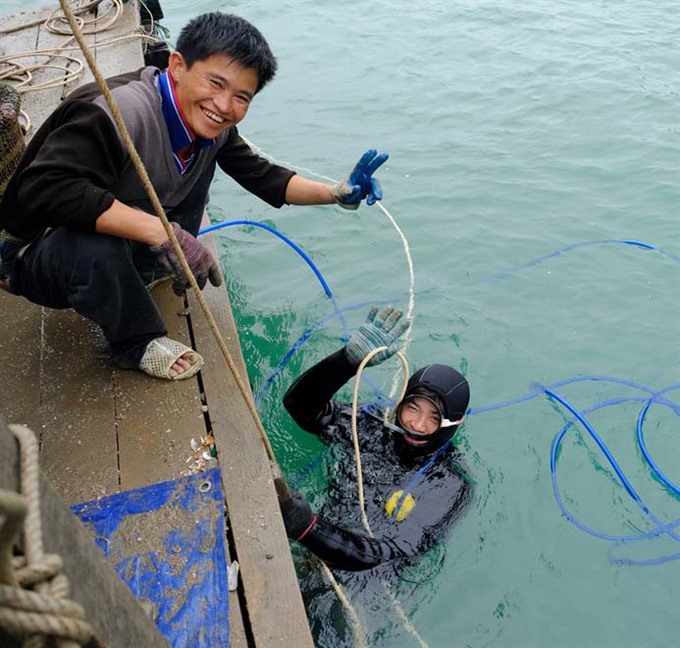 Society
Society

Ngô Văn Tính, 19, a diver with seven years’ experience, went to sea with his father when he was a child and had his first dive at 12.
 |
| A diver about to dive in the waters off Cô Tô District in the coastal province of Quảng Ninh. — Photo thanhnien.vn |
QUẢNG NINH — Ngô Văn Tính, 19, a diver with seven years’ experience, went to sea with his father when he was a child and had his first dive at 12.
Tính is the second son of Ngô Văn Trung, 50, a diver born in Nam Định Province who moved to the coastal province of Quảng Ninh some 30 years ago to earn a living as a seafood diver. Tính’s older brother, Ngô Văn Hoàng, 25, has also taken up the job and now works with his father and brother.
The waters off the Cô Tô, Vân Đồn and Móng Cái districts are ripe for natural and cultured fish, oysters, snails, clams, abalones and sea cucumbers. Since these types of seafood have to be gathered by hand, diving has become a well-paid occupation that attracts several locals and immigrants, the Thanh Niên (Youth) newspaper reported.
Seafood collectors often sail in teams of four divers and three to four assistants. Dressed in wet suits and masks but unlike scuba divers who are equipped with modern breathing equipment, the local divers use a simple 200-metre rubber tube.
“About 10 tonnes of clams are cultured on the seabed each year,” said Ngô Văn Trung. “Our job is to dive 20 metres deep into the sea to gather them and bring them back to the shore.”
“A strong diver can stay in the water for four hours straight. Those who are new to the job can only dive for about two hours,” he said.
As they take turns to dive, their assistants stay on the boat to watch out for the time and pull them up with a rope that is attached to each diver. Each team can gather 1 tonne to 1.5 tonnes of cultured seafood and 50 kilogrammes to 100 kilogrammes of natural seafood per day, for which each diver is paid VNĐ1 million (US$44) and an assistant VNĐ500,000 ($22).
The divers’ lives pretty much depend on their assistants. A year ago, when he was 20 metres deep under the sea, Tính’s breathing tube got stuck in a fishing net and got clogged.
“Luckily, we found out, pulled him up and did cardiopulmonary resuscitation,” Trung said. “After that, he got pneumonia and had to stop diving for a year.”
Two divers in Trung’s team almost died in November 2017 when a fishing vessel came in their direction while they were diving to gather clams in the waters off Vân Đồn District. “It would have run over their breathing tubes and killed them if we weren’t able to signal the skipper to turn in another direction,” Trung said.
It is common for divers to become deaf or have rhinitis and other respiratory diseases due to high underwater pressure, he added. “In the worst-case scenario, we can die,” he said. “We accept that risk.”
In August 2002, in Cô Tô Island, after diving for a few hours, a diver named Lê Văn Lâm, 33, became numb all over his body. He was taken to the hospital for an emergency treatment, but after that half of his body remained paralysed forever.
Three years later, his younger brother died while diving 40 metres under the sea. “It was too deep,” Lâm said. “He pulled the rope for help, and [they] pulled him up immediately, but it was too late.”
“His body was all stiffened by the time they got him out of the water,” he added. “He died before they reached the hospital.”
There are about 100 divers working in the two Cô Tô and Vân Đồn districts, according to the districts’ authorities. Diving to gather natural seafood is officially banned in Vân Đồn District, but farmers are allowed to dive to gather the sea creatures they have cultured, said Tô Văn Hải, Vice Chairman of Vân Đồn People’s Committee.
Most of the illegal divers are poor people who have no other source of income apart from what they make from diving, he added.
“It is hard to catch them red-handed because our sea area is too large,” he said.
From September 2017, about 1,000 metres of breathing tubes and 20 wet suits have been confiscated by the province’s border guard police. About VNĐ150 million ($6,600) of fines have been imposed on the illegal divers. — VNS